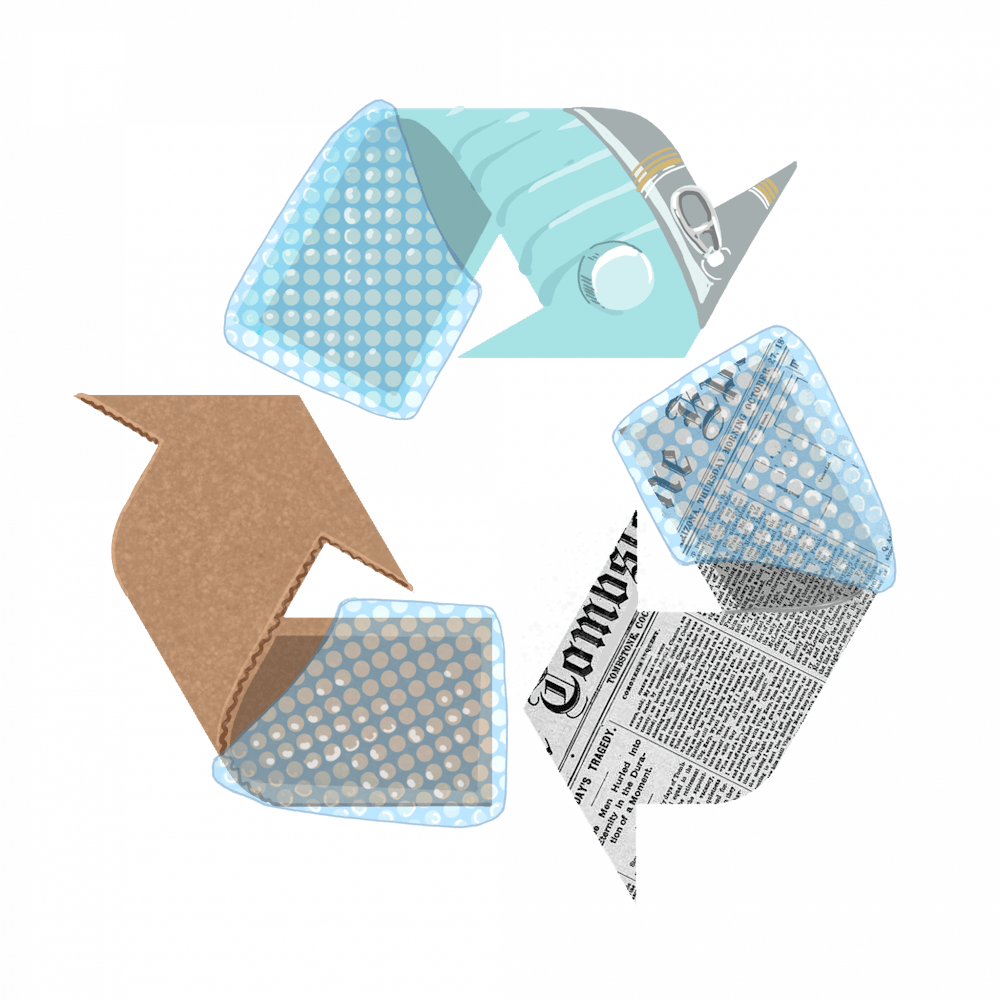Recycling is a confusing process, and it's made all the more difficult by lack of insight into recycling policies and practices. Recycling is important for a multitude of reasons—it conserves natural resources such as trees and sand, and also reduces the amount of slow–to–decompose waste in landfills—all of which benefit the environment.
So how can we actually recycle in the city of Philadelphia? What can and cannot be recycled? Fear not—we’ve condensed Philly’s (and Penn’s) recycling policies below.
Philadelphia Policies
The universal list of recyclables in the city includes plastics, paper, cartons, metals, glass, and cardboard. Restrictions, rules, and requirements are specified for each of the aforementioned categories. One important rule across all categories is the necessity of emptying and rinsing the garbage if it has come into contact with any non–recyclable contaminants like juice, food, or other waste.
A commonly held misconception is that the lids and caps of bottles or other capped recyclables are not themselves able to be recycled. This isn’t true—Philadelphia Street Department’s sustainability policies state that both lids and caps are okay to recycle. On the other hand, plastic bags are actually not okay to drop in the recycling bin. They twist around the recycling facilities’ equipment, potentially damaging it and therefore increasing the cost of maintenance.
Some other common materials that cannot be recycled are styrofoam, tissues, paper towels, napkins, needles, and disposable cups and plates, though these decompose relatively quickly in landfills.
Here’s a quick summary of what can be recycled from each category, according to the Streets Department:
Cartons: Pretty much any liquid–containing carton you can think of. Milk, wine, soup, juice—you name it. Just make sure to rinse it before tossing it in the recycling bin.
Plastics: Any bottle or jar, shampoo and detergent bottles, spray bottles, and food containers. Again, rinse them out.
Glass: Any rinsed jar or bottle.
Metals: Aluminum (including clean aluminum foil, baking dishes, and cans), and empty cans.
Paper: All paper materials (i.e. newspapers, envelopes, paperback books) as long as the materials are not enclosed in plastic.
Cardboard: Boxes, clean food boxes, paper towel rolls, and egg cartons. Make sure all shipping materials are removed prior to recycling.
So, how should you dispose of your recyclables? The city will provide residents with a recycling bin at many locations throughout the city. In addition to these numerous centers, bins are also available at several community partner locations. If none of the provided locations work for you, you can use any bin or container (up to 32 gallons), presuming that you have labeled it as “recycling.” Recycling is picked up the same day as garbage, and you can place your bin curbside.
In addition, all recyclables can be placed in the same bin, according to Philadelphia’s single–stream policy. It is, however, imperative that you correctly sort your recyclables and non–recyclables—if any non–recyclables make their way into a container, the entire bin may not be able to be recycled.
In summary, use your common sense. If a piece of garbage is at all soiled with food or liquid, don’t recycle it. If you aren’t certain, toss it in the garbage bin.
Unfortunately, for the first several months of 2019, the city of Philadelphia only recycled around half of all of the garbage picked up as a result of an expired contract with a recycling plant. Recently, however, another contract was obtained, and the city has returned to its usual recycling policies. Philacycle, a program that used to give residents points/rewards for recycling, was also discontinued earlier this year due to rising costs of the recycling process.
Penn Policies
The university’s recycling policies are nearly identical to the city of Philadelphia’s. Recycling on campus is even easier than recycling off–campus—just drop your recyclables off at any of the designated garbage locations in each of the residential buildings.
Penn also uses a system of color–coded bins: gray/black for landfill garbage, blue for single–stream recycling, and green for compost (organic/food waste). There are also specific Penn policies for lab, electronic, and miscellaneous waste.
Elemental or E–Force may be used to pick up electronic waste, according to Penn’s Waste Management and Recycling system. Batteries can also be picked up and recycled at a cost by contacting the FRES Sustainability office. Lab waste, excluding waste from tissue culture labs, can be recycled as per the usual recycling policies.
Furniture can be recycled through Ben’s Attic. Shoes and clothing can be reused through PennMOVES or left at the Goodwill dropoff box outside of Rodin College House.
It behooves us all to abide by the city’s, and our university’s, recycling policies. We have plenty of reasons to do so—not only will it help our environment and our world’s wildlife, it could also likely boost your mood. So, if you don't already, grab a bin and start sorting your waste today.







